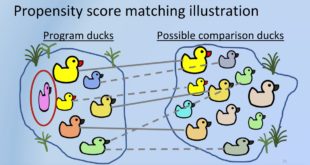.[embedded content]
Read More »Leninpriset? Nej tack!
Fjorton gånger har priset delats ut, blott tre gånger har nâgon tackat nej: Göran Palm (2012, då det i stället gick till Sven Lindqvist), Susanna Alakoski (2013, hon ville inte förknippas med diktatorn Lenin) och Åsa Linderborg (2016, Myrdal gick emot styrelsens val av Linderborg som då tackade nej). Alla andra pristagare, däribland Mattias Gardell, Sven Wollter, Sven Lindqvist, Mikael Wiehe, Roy Anderson och de senaste åren författaren Nina Björk och journalisten Kajsa Ekis...
Read More »Econometric FUQs
If you can’t devise an experiment that answers your question in a world where anything goes, then the odds of generating useful results with a modest budget and nonexperimental survey data seem pretty slim. The description of an ideal experiment also helps you formulate causal questions precisely. The mechanics of an ideal experiment highlight the forces you’d like to manipulate and the factors you’d like to hold constant. Research questions that cannot be answered by any...
Read More »I’m a believer
.[embedded content]
Read More »Donald Rubin on the history of causal inference
Donald Rubin on the history of causal inference .[embedded content]
Read More »Summer Wine
.[embedded content]
Read More »Propensity score analysis — some critical remarks
Propensity score analysis — some critical remarks Our findings suggest that researchers need comprehensive knowledge of model assumptions and knowledge of plausible causal structure. From prior research, sources of selection bias must be understood. Substantive knowledge of plausible causal structure typically includes the theory of change of an intervention program being evaluated, which determines the covariates that should be used in the model predicting...
Read More »Ayn Rand — a perverted psychopath
Ayn Rand — a perverted psychopath .[embedded content] Now, I don’t care to discuss the alleged complaints American Indians have against this country. I believe, with good reason, the most unsympathetic Hollywood portrayal of Indians and what they did to the white man. They had no right to a country merely because they were born here and then acted like savages. The white man did not conquer this country … Since the Indians did not have the concept of...
Read More »Mill’s methods of causal inference (student stuff)
Mill’s methods of causal inference (student stuff) .[embedded content] As we all know, R. A. Fisher was not too happy about Mill’s method of difference, since it, according to him, built on the impossible requirement of being able to compare identical units under different circumstances. Fisher instead favoured the experimental method of randomized treatment assignment. But if you cannot assign treatment randomly — as in most observational studies — there...
Read More »Svensk inflationsberäkning — rena skämtet!
Svensk inflationsberäkning — rena skämtet! Den andra saken som framgår tydligt vid en titt på statistiken är vad som saknas i KPI: prisuppgången på bostäder. Posten boende står visserligen för hela 25 procent av indexet. Kostnaden har sedan mellan 1996 och 2021 stigit med drygt 40 procent. Vänta nu här, säger alla som tillbringat mer än fem minuter pà sajten Hemnet de senaste 15 åren. Är det inte en alleles for låg siffra? Visst är det så. Det...
Read More » Lars P. Syll
Lars P. Syll




